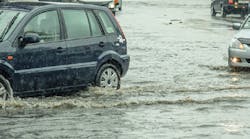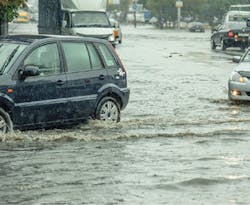Disaster Preparation
The recent natural disasters have challenged residents in affected areas to plan more thoroughly for events
For the past two decades, my work has involved a lot of travel for presenting continuing education programs, attending dental and dental hygiene conferences, and spending time with students at colleges and universities all over North America. It’s a thrill to see how people come together to create communities and work together. It is also interesting to see the regional differences that often reflect the physical landscape of the area.
On August 31, I flew to Wichita, Kansas. My hotel room faced west, overlooking the Arkansas River. The water was so still it looked like glass. Dozens of people in kayaks and paddleboards leisurely glided past the colorful artwork floating in the middle of the waterway. The sculpture is a huge strand of DNA depicting the vital interaction of human genetic material and water. The Wichita Wingnuts baseball team was playing in the brightly lit stadium on the other side of the river. The sound of the Star-Spangled Banner filled the air. As darkness fell, the Labor Day weekend celebrations commenced with a huge firework display on the river’s edge that punctuated the night sky. It was a quintessential portrait of Midwestern America.
While this Norman Rockwell moment was soothing, my mind and heart were totally pre-occupied with the damage Hurricane Harvey was creating for my friends, colleagues, and neighbors in Texas and Louisiana. Two high-pressure cells kept Harvey parked over a large portion of southeast Texas. The Houston area averages 50 inches of rain a year. Many parts of Houston got 50 inches in three days.
There were houses in Houston that were left high and dry, while others were a total loss. The range of devastation affected everyone in the path of the storm. Roads were impassible, food was in short supply, some lost power, and others lost their lives or everything they owned. It will take months and even years for communities to recover from this event.
It was exhausting to keep up with the news. The storm and rescue updates seemed to change every time I listened to a report. Mother Nature was in charge of the weather, but people were in charge of how they chose to deal with it. Overall, it was heartwarming to see how people from all over the region and country worked together to keep one another safe and calm. It was disheartening to hear a few critics put in their two cents’ worth that Houston and surrounding areas should have been better prepared.
One week later I was in Montana. Huge fires were burning throughout the state. The sky was white from the smoke. It was hard to breathe. Again, Mother Nature was in charge, and it was interesting to see the imbalance of too much water in Texas and Louisiana in contrast to the dangerous, dry conditions in the West. A few days later, Irma started forming, and within days it created a wide path of destruction as it charged through the Caribbean and blanketed Florida with wind, rain, and storm surges. Thankfully, Irma was not as catastrophic as many had predicted, but that is little consolation for those now suffering from it.
Preparing for a disaster
Have a backup plan. Nothing is worse than trying to figure out what to do on the fly when crisis looms. Don’t let fear control how you act. Be creative. Sit down and develop some strategies when your emotions are not frazzled.
Create a savings plan now and reduce or eliminate your dependence on credit. Have a strategy to access cash reserves that can carry you through an immediate crisis. Financial freedom reduces the chances of making bad decisions.
Relationships are gold. Keep them healthy and solid. You never know when your friends or neighbors might be cooking your next meal, helping you clean up your house, or providing a place to get much needed rest.
Remember possessions are only stuff. Undoubtedly that is hard to remember when things are damaged or lost, but stuff can be replaced. Lives and relationships are far more important than material goods.
Don’t expect a rescue squad. Stay informed. Make adult decisions. Take responsibility for your actions.
Help others. We each have different skill sets and talents. Make your actions count in the recovery process. If you’re looking for a way to help people, feel free to contact me.
Focus on your health. Keep yourself mentally and physically strong. Take time to eat and rest. Your body and mind need fuel and rest.
Give those around you some slack. Traumatic events and losses have inexplicable consequences. Pet an animal, offer a smile, or say a simple prayer. Time does heal.
Regardless of where you live, weather and natural events are bound to happen. Every community is at risk for some type of natural event, whether floods, earthquakes, ice storms, volcanic eruptions, blizzards, tornadoes, droughts, hurricanes, or fires. There are lessons to learn from these disasters (see sidebar), and these lessons can be applied to other events in our lives—job loss, death, family breakups, and health challenges.
Yes, Hurricane Harvey was as bad as it looked, but life goes on. The other disasters were also bad. Thank goodness that we live in a part of the world where events like this are not a daily occurrence. Most of us have plenty of food, adequate shelter, the ability to work, and reasonable health. We don’t have to wake up every day wondering if our children will have enough food, if we will die from a simple infection because there is no medicine, or if our neighborhood will be bombed to smithereens because by some political faction.
This nation is full of resources to rebuild communities. We have the strength and resolve to get past immediate issues. While Hurricanes Harvey and Irma and the fires in the West impacted many people, as a nation we came together to deal with the immediate crises. The next step is to move forward collectively and continue to support the long-term recovery efforts, and to be thankful for all that we have.
ANNE NUGENT GUIGNON, RDH, MPH, CSP, provides popular programs, including topics on biofilms, power driven scaling, ergonomics, hypersensitivity, and remineralization. Recipient of the 2004 Mentor of the Year Award and the 2009 ADHA Irene Newman Award, Anne has practiced clinical dental hygiene in Houston since 1971, and can be contacted at [email protected].









